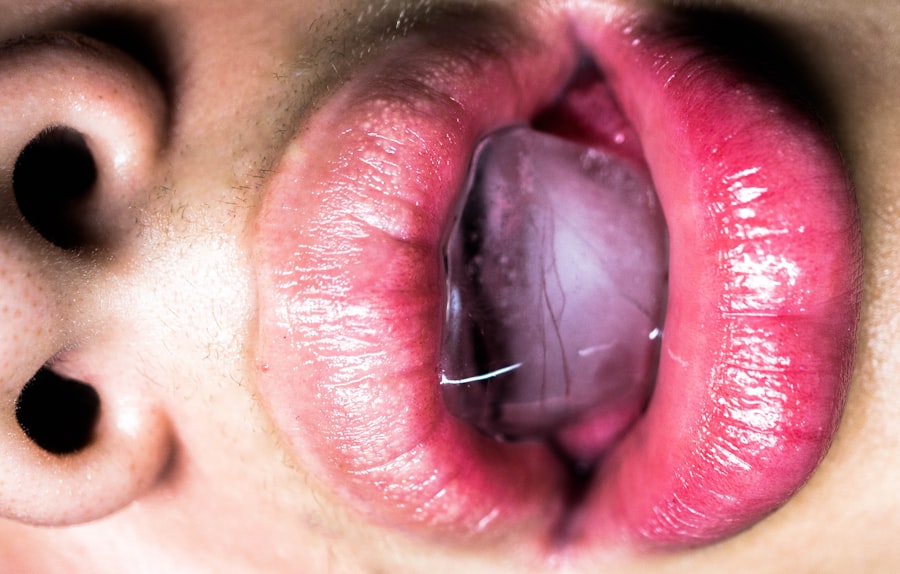The oral microbiome refers to the complex community of microorganisms that inhabit your mouth, including bacteria, viruses, fungi, and protozoa. This diverse ecosystem plays a crucial role in your oral health and overall well-being. Within your mouth, these microorganisms exist in a delicate balance, working together to maintain a healthy environment.
When this balance is disrupted, it can lead to various health issues, both locally in the mouth and systemically throughout the body. Understanding the oral microbiome is essential for recognizing its significance in your daily life. Each individual has a unique oral microbiome, shaped by factors such as genetics, lifestyle, and environment.
This uniqueness means that what works for one person may not necessarily work for another. By exploring the intricacies of your oral microbiome, you can gain insights into how to nurture it effectively and promote better health outcomes.
Key Takeaways
- The oral microbiome refers to the diverse community of microorganisms that live in the mouth, including bacteria, viruses, fungi, and other microbes.
- A healthy oral microbiome is essential for overall health, as it plays a role in digestion, immune function, and even mental health.
- Imbalances in the oral microbiome can lead to dental issues such as cavities, gum disease, and bad breath.
- Research has shown that the oral microbiome is linked to systemic diseases such as diabetes, heart disease, and even certain cancers.
- Factors such as oral hygiene, diet, medications, and lifestyle choices can impact the balance of the oral microbiome, highlighting the importance of maintaining a healthy oral environment.
The Role of the Oral Microbiome in Overall Health
The oral microbiome plays a pivotal role in your overall health, acting as a first line of defense against pathogens that could cause infections. The microorganisms present in your mouth help to break down food particles and produce substances that can inhibit harmful bacteria. This protective function is vital for maintaining not only oral health but also systemic health, as the mouth serves as a gateway to the rest of your body.
Moreover, research has shown that the oral microbiome can influence various bodily functions, including digestion and immune response. A balanced oral microbiome can enhance nutrient absorption and support your immune system’s ability to fend off illnesses. Conversely, an imbalanced microbiome may contribute to chronic inflammation and other health issues, underscoring the importance of maintaining a healthy oral environment.
How the Oral Microbiome Affects Dental Health

Your dental health is intricately linked to the state of your oral microbiome. A balanced microbiome helps prevent dental issues such as cavities and gum disease by keeping harmful bacteria in check. When the balance is disrupted—often due to poor oral hygiene, diet, or other factors—pathogenic bacteria can proliferate, leading to plaque formation and inflammation of the gums.
In addition to causing immediate dental problems, an unhealthy oral microbiome can have long-term consequences for your teeth and gums. Chronic gum disease, for instance, can result in tooth loss and has been associated with other serious health conditions. By understanding how your oral microbiome affects dental health, you can take proactive steps to maintain its balance and protect your smile.
The Connection Between the Oral Microbiome and Systemic Diseases
| Systemic Disease | Associated Oral Microbiome | Reference |
|---|---|---|
| Cardiovascular Disease | Porphyromonas gingivalis, Streptococcus mutans | https://www.ncbi.nlm.nih.gov/pmc/articles/PMC6413826/ |
| Diabetes | Aggregatibacter actinomycetemcomitans, Porphyromonas gingivalis | https://www.ncbi.nlm.nih.gov/pmc/articles/PMC6413826/ |
| Alzheimer’s Disease | Porphyromonas gingivalis | https://www.ncbi.nlm.nih.gov/pmc/articles/PMC6413826/ |
| Rheumatoid Arthritis | Porphyromonas gingivalis | https://www.ncbi.nlm.nih.gov/pmc/articles/PMC6413826/ |
Emerging research has revealed a fascinating connection between the oral microbiome and systemic diseases. Conditions such as cardiovascular disease, diabetes, and respiratory infections have been linked to imbalances in the oral microbiome. For example, certain bacteria associated with gum disease have been found in arterial plaque, suggesting that oral health may influence heart health.
This connection highlights the importance of viewing oral health as an integral part of overall health. By prioritizing your oral microbiome, you may be able to reduce your risk of developing systemic diseases. Understanding this relationship empowers you to take charge of your health by focusing on maintaining a balanced oral microbiome through proper hygiene and lifestyle choices.
Factors That Impact the Oral Microbiome
Several factors can influence the composition and balance of your oral microbiome. One of the most significant factors is diet; what you eat can either nourish beneficial bacteria or promote the growth of harmful ones. High-sugar diets, for instance, can lead to an increase in cavity-causing bacteria, while a diet rich in fruits, vegetables, and whole grains supports a diverse and healthy microbiome.
Other factors include lifestyle choices such as smoking and alcohol consumption, which can negatively impact your oral microbiome. Additionally, stress levels and hormonal changes can also play a role in shaping your microbial community. By being aware of these factors, you can make informed decisions that support a healthy oral environment.
The Importance of Oral Hygiene in Maintaining a Healthy Oral Microbiome

Maintaining good oral hygiene is crucial for supporting a healthy oral microbiome. Regular brushing and flossing help remove food particles and plaque that can harbor harmful bacteria. By establishing a consistent oral hygiene routine, you create an environment where beneficial microorganisms can thrive while minimizing the risk of pathogenic overgrowth.
In addition to brushing and flossing, routine dental check-ups are essential for monitoring your oral health. Your dentist can identify early signs of imbalance in your oral microbiome and provide guidance on how to address any issues. By prioritizing oral hygiene, you not only protect your teeth and gums but also contribute to the overall health of your microbiome.
The Role of Diet in Supporting a Healthy Oral Microbiome
Your diet plays a significant role in shaping your oral microbiome. Foods rich in fiber, vitamins, and minerals support beneficial bacteria while helping to keep harmful bacteria at bay. Incorporating a variety of fruits and vegetables into your meals provides essential nutrients that promote microbial diversity in your mouth.
Conversely, diets high in sugar and processed foods can lead to an imbalance in your oral microbiome. These foods often feed harmful bacteria that contribute to dental decay and gum disease. By making conscious dietary choices, you can foster a thriving oral microbiome that supports both dental health and overall well-being.
The Impact of Medications on the Oral Microbiome
Medications can significantly impact the composition of your oral microbiome. Antibiotics, for example, are known to disrupt the balance of bacteria in both the mouth and gut. While they are effective at eliminating harmful pathogens, they can also wipe out beneficial bacteria, leading to dysbiosis—a state where harmful bacteria dominate.
Other medications, such as those used to treat high blood pressure or depression, may also affect saliva production or alter the microbial landscape in your mouth. Being aware of these potential side effects allows you to take proactive measures to support your oral microbiome during medication use, such as incorporating probiotics or discussing alternatives with your healthcare provider.
Strategies for Improving the Oral Microbiome
Improving your oral microbiome involves adopting a holistic approach that encompasses various lifestyle factors. Start by prioritizing good oral hygiene practices—brush twice daily with fluoride toothpaste and floss regularly to remove plaque buildup.
Dietary changes are equally important; focus on consuming whole foods rich in fiber while minimizing sugar intake. Staying hydrated is also crucial for maintaining saliva production, which plays a vital role in protecting your oral microbiome. Lastly, consider incorporating stress-reducing practices such as mindfulness or exercise into your routine to support overall health.
The Future of Oral Microbiome Research
The field of oral microbiome research is rapidly evolving, with scientists uncovering new insights into its complexities and implications for health. Future studies may explore how specific strains of bacteria influence various health conditions or how personalized approaches to oral care can optimize individual microbiomes. As research progresses, we may see advancements in probiotic therapies designed specifically for oral health or innovative dental products that promote microbial balance.
Staying informed about these developments will empower you to make educated choices regarding your oral care and overall well-being.
Prioritizing Oral Microbiome Health for Overall Well-being
In conclusion, prioritizing the health of your oral microbiome is essential for achieving optimal overall well-being. By understanding its role in dental health and systemic diseases, you can take proactive steps to maintain a balanced microbial community in your mouth. Emphasizing good oral hygiene practices, making informed dietary choices, and being mindful of medications will all contribute to nurturing your oral microbiome.
As research continues to unveil the intricate connections between the oral microbiome and overall health, it becomes increasingly clear that taking care of this vital ecosystem is not just about having a bright smile—it’s about fostering a healthier you from the inside out. By making conscious efforts to support your oral microbiome today, you are investing in a healthier future for yourself.
The oral microbiome plays a crucial role in maintaining oral health and can influence overall well-being. For a deeper understanding of this fascinating topic, you can explore the article on the oral microbiome available at Hey Did You Know This. This resource provides insights into how the diverse community of microorganisms in our mouths affects everything from dental health to systemic diseases.
WATCH THIS! The $14 Billion Lie Hiding in America’s Drugstore
FAQs
What is the oral microbiome?
The oral microbiome refers to the community of microorganisms that live in the mouth. This includes bacteria, viruses, fungi, and other microbes.
Why is the oral microbiome important?
The oral microbiome plays a crucial role in maintaining oral health, as well as influencing overall health. It helps in digestion, protects against harmful pathogens, and contributes to the immune system.
How does the oral microbiome affect oral health?
The balance of microorganisms in the oral microbiome is important for preventing oral diseases such as tooth decay, gum disease, and bad breath. Disruptions in the oral microbiome can lead to these conditions.
Can the oral microbiome affect overall health?
Yes, research has shown that the oral microbiome can impact overall health. Imbalances in the oral microbiome have been linked to conditions such as cardiovascular disease, diabetes, and respiratory infections.
How can the oral microbiome be maintained?
Maintaining a healthy oral microbiome involves practicing good oral hygiene, including regular brushing and flossing, as well as avoiding excessive sugar consumption and tobacco use. Consuming probiotics and maintaining a balanced diet can also support a healthy oral microbiome.
